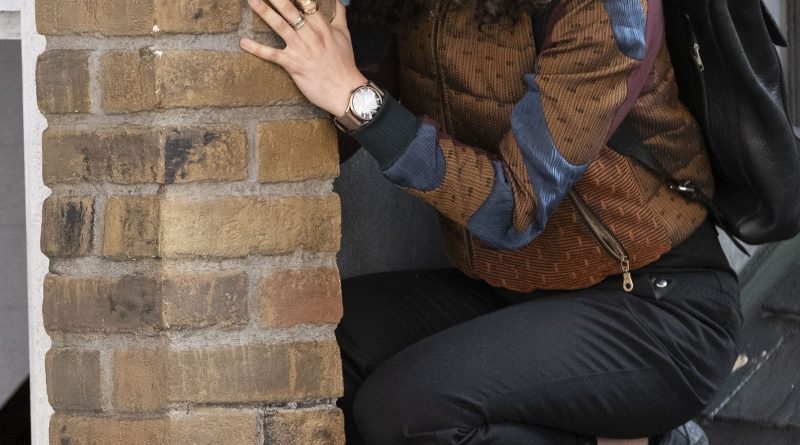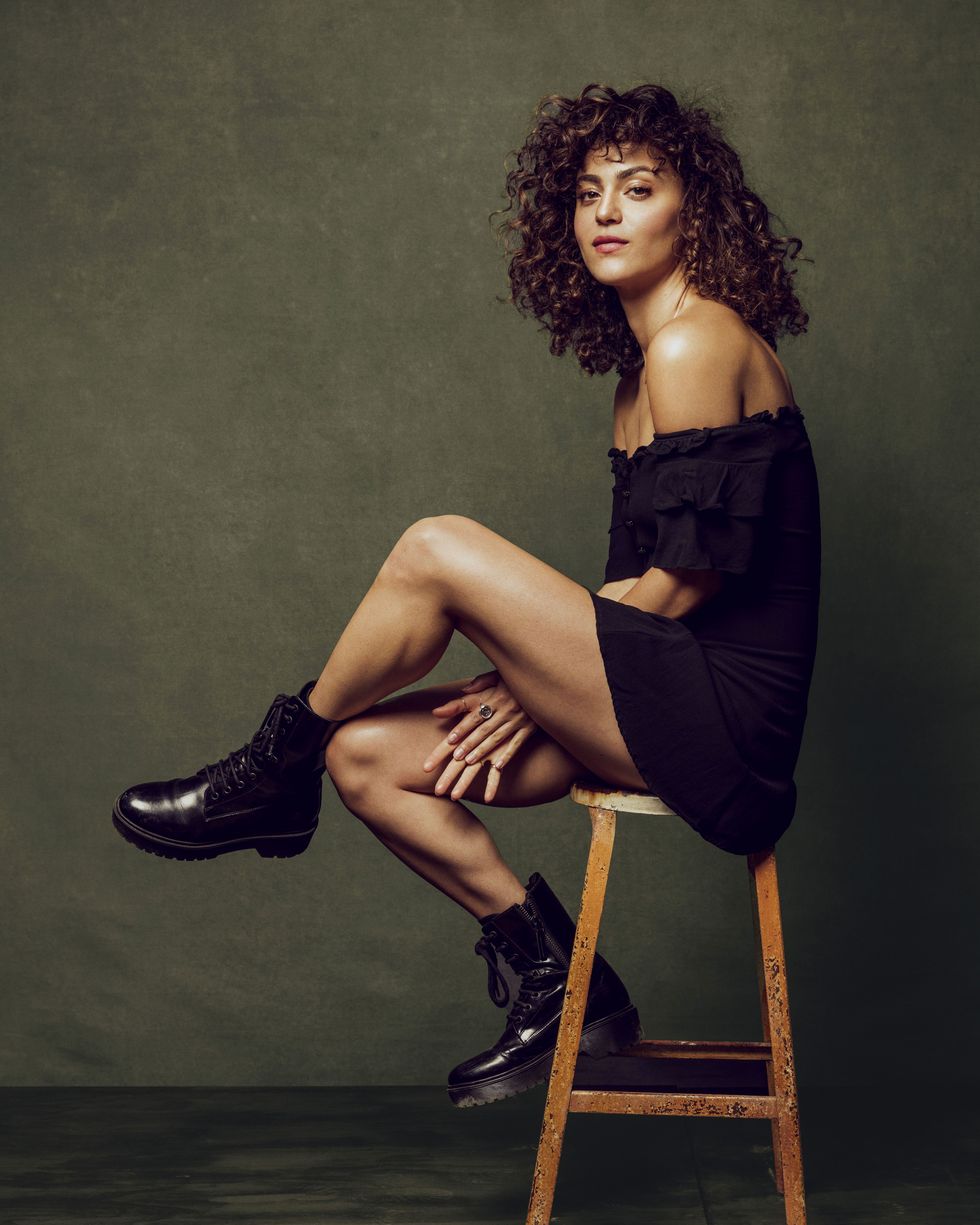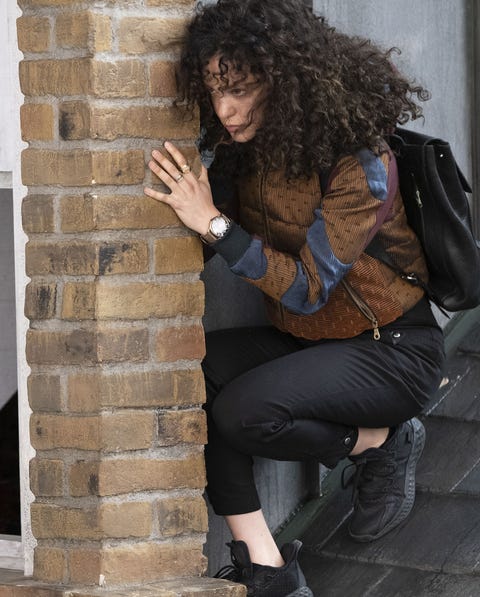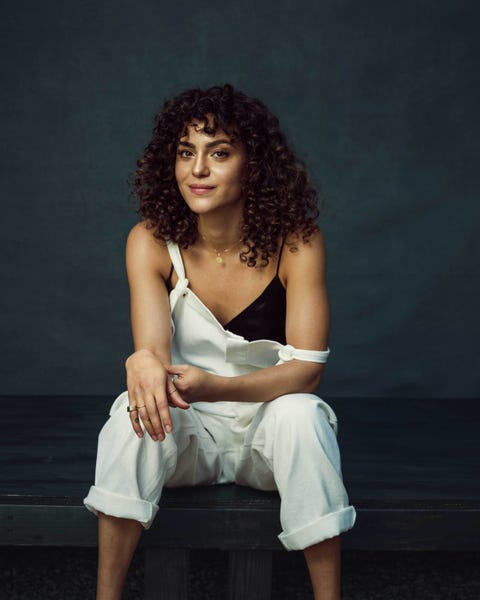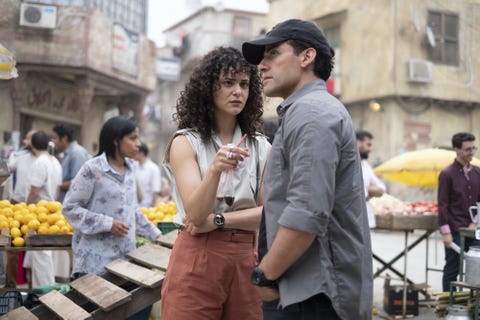May Calamawy Is Doing Moon Knight Her Way
Despite starring in the action-thriller Moon Knight, the latest Disney+ show to introduce a Marvel Comics hero to the screen, May Calamawy never felt like a “badass.” Shooting the horror-infused limited series was tough work and she admittedly wasn’t used to this sort of exertion. “The stunt team would throw me into situations,” Calamawy tells ELLE.com over Zoom. “It was only later that I’d be like, ‘Oh, I did that.’” But as a viewer, you can’t tell. The actor looks every bit the action star as Layla El-Faouly, an archaeologist who might not boast superpowers like Oscar Isaac’s titular vigilante, imbued with powers of an Ancient Egyptian god, but still manages to hold her own in various stand-offs and save herself a few times too. “She has learned to fight on the streets,” adds Calamawy. “I never wanted her fighting to be choreographed or clean, or like she knows exactly what she’s doing. She’s kind of just reacting and it’s working for her and I really love that.”
It’s what makes Layla stand out from earlier female sidekicks in the Marvel Cinematic Universe, like Gwyneth Paltrow’s Pepper Potts, Natalie Portman’s Jane Foster, and Rachel McAdams’ Christine, who were introduced as love interests for the male leads, damsels to be saved, or both. Of course, in the last 20 years since the MCU began, the narrative has evolved to let female superheroes like Black Widow and Captain Marvel lead solo films and give female sidekicks heroic arcs too: This year’s Thor: Love and Thunder will see Jane Foster become worthy to wield Mjolnir, his famous hammer. But Layla marks the first time an Arab woman has been given this sort of heroic representation and that was fundamental to series director and executive producer Mohamed Diab’s vision. “One of the first things that we wanted to have was a very real depiction of Egypt,” Diab tells ELLE.com. “We thought of some of the greatest Egyptian actresses around and one of them was May.”
Born and, mostly, raised in Bahrain in 1986 to an Egyptian father and a Palestinian mother, after high school Calamawy moved to Boston, Massachusetts to study industrial design at her father’s request. Deep down though, she knew she wanted to act. “He definitely didn’t want me to do this,” says the actor, who, after a brief stint living in Dubai, decisively applied and was accepted to complete a B.A. in theater studies at Emerson College and later study at the William Esper Studio in New York City. “After university, my mom started to be more okay with the idea.”
Calamaway describes her mother as her “main champion,” but she sadly passed away during her 20s from stage 4 lung cancer which led to her dad suggesting she focus on a more stable occupation. The actor tried. For two years she put her dreams aside for a “normal job” but she couldn’t shake the call to act and luckily her dad wasn’t going to get in her way. “The nice thing I’ll say, he was never like, ‘I know, you’re gonna be an actor,’ but he was like, ‘Listen, I’m here for you if you want to try this, okay?’ and it was enough support for me,” she says. “Thank God I believed in myself enough to be like, I am gonna do this.”
With renewed determination, Calamawy started to book roles in short films and began to earn her family’s approval. Yet, she felt a growing frustration with the type of roles she was auditioning for in the U.S. because of her Arab heritage. “In the beginning, I was fully aware I would have to go in because I was Arab and they were intense roles involving terrorism to some degree,” the actor, who is fluent in English and Arabic, explains. “This is not what it’s like when you grow up in the Middle East; you have a really normal, fun life and what you see on the news is not what’s happening 24/7.”
But even the Middle Eastern and North African (MENA) movies the actor grew up watching back home failed to some extent to reflect the full reality of what it is to be a woman because of the censorship and restrictions placed on filmmakers. “The Middle East is in somewhat of a bind where it wants its story to be told but then it wants it to be told under certain rules of what can be shared and not shared,” she says pointing to her own experience of having to hide a more independent, spirited side to her personality to be considered respectable. “I think every girl has an alter [ego] in a way and I just wanted to watch a movie that’s showing, like, the side of the personality that’s not being shown to the families and parents and whatnot, because that exists. It keeps getting hidden but that’s where we can all relate to each other. We’re in this weird place where I don’t really relate to everything there because we’re not fully showing ourselves.”
Recent films like Memory Box and Souad offer the Arab world depictions of MENA women Calamawy was looking for, but it was in 2014 that she saw herself on screen for the first time via Saudi actor Dina Shihabi. They had met in 2009 through a mutual friend but Calamawy had returned to the Middle East to help care for her mother. Five years went by and she was questioning whether she should return to the States but then she saw the romantic drama Amira & Sam, starring Shihabi as the titular female lead: “I always tell her, ‘You were such an expander for me, because I saw you doing you, I saw you doing what we both said we were going to do and you were actually doing it,’” she says. “That was a huge reason for why I was like, ‘I can do that too.’”
She certainly could. After landing small roles in TV dramas Madame Secretary, The Long Road Home, The Brave, and FBI, in 2019, Calamawy finally got the chance to play an Arab woman more aligned with who she is and her experience of the world rather than Hollywood’s limiting stereotypes. In Ramy—Ramy Youssef’s self-titled comedy series exploring a first-generation Egyptian American Muslim’s spiritual journey, balancing moral expectation and Western apathy towards consequences—Calamway plays his sister Dena, a graduate student and non-practicing Muslim who might feel more relaxed navigating two cultures but still has to deal with fetishization as the Exotic Other. “I just wanted to play myself, I said that to an agent and then a few months later, I booked this role on Ramy, which offered me that,” she says. “We did target some of those issues that pop up about men fetishizing Arab women and we will only be able to get out of that when we see a large range of Arab women in Western cinema.”
Moon Knight’s Layla is a big step in the right direction for that sort of reappraisal. In the original comic book series, Moon Knight is the alias of Marc Spector, a mercenary who has a romantic relationship with Maurene Alraune, the blonde bombshell daughter of archaeologist Dr. Peter Alraune. Typical of Hollywood’s Orientalism—the term Palestinian author Edward Said used to define the monolithic representation of Eastern cultures through a colonialist lens—Egypt and its mythology is used to center these white characters. Given, however, the recent precedent set by MCU films Black Panther and Shang-Chi, Diab and his producing partner Sarah Goher (also his wife) were banking on Kevin Feige’s previous commitment to cultural authenticity to change the characterization of Maureen from what was in head writer Jeremy Slater’s original script. “It started even on the page as a white woman and when we came on board, me and Sarah, she was then changed into half Egyptian and we pushed it,” the Egyptian filmmaker recalls. “Let’s make it into an Egyptian character and they welcomed that.”
Goher was the one who tracked down Calamawy on social media to convince her to audition for the role. “She just stalked her on Instagram and we started asking her right away, ‘Are you free at that time?’ because I felt she was going to land the job,” Diab says. “[May] at the beginning, had to ask her manager if this was legit or not but everyone fell in love with her the moment she auditioned with Oscar…Sparks!”
But the fight for getting Egypt and the Egyptian characters right wasn’t over after she got the gig. It was a team effort to ensure lazy stereotypes or Arab generalizations weren’t being used. “Anytime I felt uncomfortable, I would go talk to [Mohamed] and his wife and I love how Kevin Feige gave us the freedom to share that, let people know, ‘This is not what it’s like, if we do that it’s gonna be a stereotype,’” Calamawy says. “I realized quite early on this is a space where my voice was going to be heard and that’s the best feeling.”
The actress also didn’t want to simply portray a colorblind version of that other famous tomb raider, Lara Croft. “I was careful not to draw inspiration from someone in the West because they want me to bring my side,” she says. “In the Middle East, I find women have such a soft strength to them. And I was like, ‘How can I bring this to her? Why should I sit and copy what I think Angelina Jolie would do?’ Every woman I know is a bunch of dichotomies, and I wanted to bring that.”
As a curly-haired girl of Arab descent myself, I love this new strong female character that Calamawy has brought to life and who I, among other MENA women, can see ourselves in. But the power of her performance and the nuances of Layla’s personality allow for any woman to relate to her story. Hopefully, the final installment of Moon Knight’s six-episode limited season won’t mark the end of Layla El-Faouly’s journey but rather signal her bright future in the MCU. For now, Calamawy is leaving it up to fate. “Whatever is aligned with me comes to me and I trust in what’s going to come,” she says. “I’m not worried because I know what’s going to come is how I can best serve and that’s all I want to do.”
Moon Knight is available to watch on Disney+ with a new episode each Wednesday until May 4.
This content is created and maintained by a third party, and imported onto this page to help users provide their email addresses. You may be able to find more information about this and similar content at piano.io

